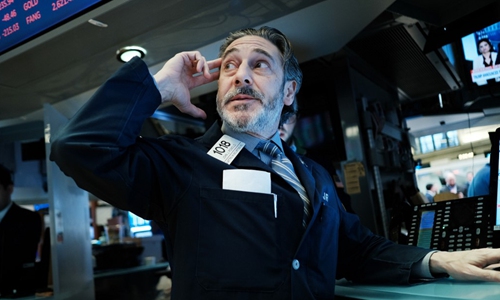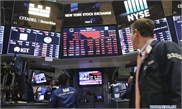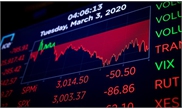SOURCE / MARKETS
Trump bunged on virus prevention, US stock market just crashed

Traders work on the floor of the New York Stock Exchange (NYSE) on March 16, 2020 in New York City, US. Photo: AFP
An unprecedented dive in US stocks on Monday has almost wiped out the Dow's gains since Donald Trump was sworn in as the 45th US President. The stock market rout sparked by the Trump administration's inability in tackling the coronavirus appears to be evolving into a "black swan" event in the 2020 presidential election, adding uncertainty to his re-election, experts said.
Trump's much-touted political capital - a 10,000-point rally in the Dow - has almost come to naught. The Dow Jones Industrial Average closed at 20,188.52 points on Monday, down nearly 3,000 points in the biggest rout since 1987. The Dow fell to 19,882.26 points in the early session on Tuesday. The index ended at 19,732.40 points in the trading day prior to January 20, 2017 when Trump took office. There are only 149.86 points, or a mild drop, to go before the Dow's gains under Trump are zeroed out.
If Trump fails to stabilize the stock market in the short term, his re-election would be exposed to more uncertainties and facing peril, Song Guoyou, deputy director of the Center for American Studies, Fudan University, told the Global Times.
The Dow has been on a bull run since Trump became president. It hit an all-time high of 29,568 points intraday on February 12, slightly shy of 30,000 points. Along with the rally was a series of tweets in which Trump claimed credit.
"The Stock Market is setting record after record and unemployment is at a 17-year low. So many things accomplished by the Trump Administration, perhaps more than any other President in first year," Trump tweeted on December 23, 2017. "Stock Market up big today. A New Record. Enjoy!" he tweeted on November 7, 2019. "Stock market at all-time high!" he hailed in a tweet on January 9.
Since taking office, Trump has billed the stock rally as one of his major accomplishments. He believed that it was his policy that had been driving the market. In his remarks at the annual World Economic Forum in Davos in January 2018, Trump said "we've set 84 records since my election - record stock market prices, meaning we hit new highs 84 different times out of a one-year period. And that's a great thing."
Additionally, Trump has piled pressure on Federal Reserve Chair Jerome Powell to cut rates and calm market tumult.
Nonetheless, the US stock market, the "life giver" Trump has relied on, took an unprecedented dive after reaching its peak in mid-February, with three trading halts in a week easily plunging US stocks into bear territory.
The jaw-dropping stock market performance initially silenced him before prompting him to blame others. Trump blamed Democratic candidates for the stock market plunge after the Dow lost nearly 900 points on February 25. He also blamed an oil price war between Russia and Saudi Arabia for a precipitate selloff on March 9 when the Dow plummeted over 2,000 points.
The Fed on Sunday surprised the markets by making an emergency rate cut that lowered the benchmark federal funds rate by a full percentage point to near zero plus quantitative easing packages of $700 billion worth of asset purchases, only sinking the markets further into panic and leading to the rout on Monday.
The wild swings in the US market occur on the back of the Trump administration's bungled response to the coronavirus outbreak, said Jin Canrong, professor of international relations of Renmin University of China's School of International Studies in Beijing.
The US economy would certainly grow at a slower pace this year than last year amid the pandemic, according to Jin, noting that economic woes and the sagging wealth of US investors are set to weigh heavily on Trump's re-election.
Global Times


